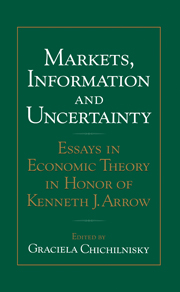Book contents
- Frontmatter
- Contents
- Preface
- List of contributors
- Section I Information and markets
- Section II Uncertainty and finance
- Section III Market externalities and justice
- 8 Moral hazard and independent income in a modern intertemporal-equilibrium model of involuntary unemployment and mandatory retirement
- 9 On the optimal schedule for introducing a new technology, when there is learning by doing
- 10 Price and market share dynamics in network industries
- 11 Exchange in a network of trading posts
- 12 Equilibrium market formation causes missing markets
- 13 Toward a general theory of social overhead capital
- 14 On population externalities and the social rate of discount
- 15 Trade and Welfare
- 16 History as a widespread externality in some Arrow–Debreu market games
- 17 Redistribution by a representative democracy and distributive justice under uncertainty
- Author index
- Subject index
8 - Moral hazard and independent income in a modern intertemporal-equilibrium model of involuntary unemployment and mandatory retirement
Published online by Cambridge University Press: 05 December 2011
- Frontmatter
- Contents
- Preface
- List of contributors
- Section I Information and markets
- Section II Uncertainty and finance
- Section III Market externalities and justice
- 8 Moral hazard and independent income in a modern intertemporal-equilibrium model of involuntary unemployment and mandatory retirement
- 9 On the optimal schedule for introducing a new technology, when there is learning by doing
- 10 Price and market share dynamics in network industries
- 11 Exchange in a network of trading posts
- 12 Equilibrium market formation causes missing markets
- 13 Toward a general theory of social overhead capital
- 14 On population externalities and the social rate of discount
- 15 Trade and Welfare
- 16 History as a widespread externality in some Arrow–Debreu market games
- 17 Redistribution by a representative democracy and distributive justice under uncertainty
- Author index
- Subject index
Summary
It is a special pleasure to participate in this Festschrift celebrating the contributions of Kenneth Arrow to economics. Almost uniquely in our profession, Arrow bestrides two worlds in economic theory – the Old World of neoclassical theory and the New World of modern theory, as I like to call it.
Arrow made significant contributions to the final expression of neoclassical theory with his work in the 1950s and subsequent years, some of it in collaboration with Gerard Debreu. Their work on the existence and uniqueness of general equilibrium and its extension to stochastic and intertemporal settings is well known. This is the theory of the equilibrium of a competitive economy operating under perfect information.
The “Arrow” to which I (and most in my age group and younger) have been drawn, however, is the pioneer in models exhibiting imperfect information. By that term, now widely used if inadequate, I refer to economic settings in which not every one is able or willing (because of costliness) to become perfectly informed about the state of the world and each participant's actions. Some information may be inherently private, hence concealable and unverifiable. His best remembered contribution, to my mind, is his rather informal yet trenchant analysis of market failure in the provision of insurance (Arrow (1953)). That essay, with its emphasis on asymmetric information, seems to have heralded the direction of the modern economic models emerging in subsequent years. Moral hazard and adverse selection both make their appearance in that essay.
- Type
- Chapter
- Information
- Markets, Information and UncertaintyEssays in Economic Theory in Honor of Kenneth J. Arrow, pp. 143 - 164Publisher: Cambridge University PressPrint publication year: 1999

